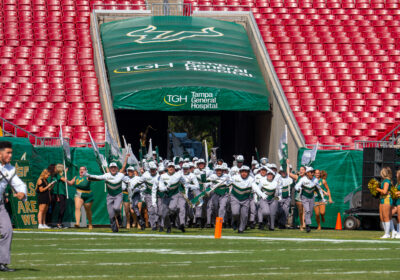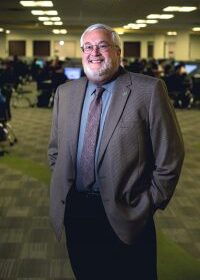Robots take over USF theater in R.U.R.
From iPhones to automated cash registers, technology is ubiquitous in todays society. The latest production from the School of Theatre and Dances science-themed season examines the dangers of robotic dependency.
R.U.R. (Rossums Universal Robots), which opens tonight at 8 in Theatre 2, examines the effects of the use of technology, particularly robots, in everyday life. The original play actually introduced the word robot into the English language and was the basis for the Will Smith blockbuster I, Robot.
Written in 1920 by Karel Capek, R.U.R. is set on an island where robots are being manufactured and shipped out worldwide to aid humans in factories, farming and housework.
Marc Powers, director of the USF School of Theatre and Dance and the production of R.U.R., said the play is about the assumptions of where technology would be in the future; specifically, the idea of being able to bio-engineer humanlike robots with human characteristics.
The humans have made some horrible mistakes in what kind of things they allow the robots to do and what they use them to do, he said. And there are severe consequences.
Capeks play shows how these humanlike robots take over the everyday jobs in that world, and the consequences that humans will suffer as a result of their mass production.
The robots reach a point where they no longer want to be slaves, said Marlene Peralta, a senior majoring in theatre arts. The robots see that they are much better than humans. They know everything, they can do everything for themselves.
Peralta plays three robots in the play Sulla, Lena and Helena with each robot being an upgraded version of the previous. Just like technology today, Marlene says that with each new robot, she goes through all of those changes new part of me is coming out.
Brette Morningstar, a junior majoring in theatre performance, said one thing that struck her about this play is how it relates to real world unemployment, with technology replacing many jobs previously held by humans.
Morningstar plays Mrs. Fabry, the general engineer for Rossums Universal Robots.
Out of the other female characters, shes very much less feminine, she said. Shes kind of a woman in a mans world.
Alex Rivera, a senior majoring in psychology who also plays three generations of robots, is the only non-theatre major in the play. He said that the last version of his robot character, Radius, will actually be the one to lead the robot revolt against humans.
(Radius) is very well versed in human history and I portray him as being so pissed off at humanity because he sees the countless mistakes that they, mankind, has made over and over again, he said. He knows that the robots wont make those same mistakes, and that they should be the ones controlling over humans and not vice versa.
One of the most noticeable changes in Powers production is the use of only two actors to play all six robots in the original script. And though the play is usually done in a proscenium setting, this production will be done in an arena style, with the audience able to sit on all four sides of the stage.
Another twist to this particular production is the use of Twitter during the play. During Thursday nights performance, viewers in specific tweet seats will be encouraged to tweet what they see during the play with the hashtag #TheatreUSF.
This goes against the typical rule that says electronics are banned during a performance in a theater. Powers said that incorporating Twitter was experimental.
Were just hoping that it will all of a sudden boost much greater audience awareness and were going to see how it affects it, he said
R.U.R. runs tonight through Friday, as well as April 11-14, at 8 p.m. in Theatre 2. The show will also run April 7 and 15 at 3 p.m. Tickets are $10 for students/seniors and $15 for general admission.






